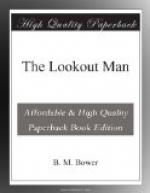“Sure takes you to think up bad luck, Murph,” Hank retorted. “We ain’t struck any down timber so fur.”
“An’ ye ain’t there yet, neither—not be four mile ye ain’t.”
Mrs. Singleton Corey, wrapped in her furs, with snow packing full every fold and wrinkle of her clothing left uncovered by the robe, did not hear the aimless argument that followed between Hank and Murphy. The sonorous shwoo-oosh of the wind-tormented pine tops surged through the very soul of her, the diapason accompaniment to the miserere of motherhood. Somewhere on this wild mountainside was Jack, huddled from the wind in a cave, or wandering miserably through the storm. Wrapped in soft luxury all her life, Mrs. Singleton Corey shuddered as she looked forth through her silken veil, and saw what Jack was enduring because she had never taught her son to love her; because she had not taught him the lessons of love and trust and obedience.
Of the girl who was lost she scarcely thought. Jack was out here in the cold and the snow and the roaring wind; homeless because she had driven him forth with her coldness; friendless because she had not given him the precious friendship of a mother. Her own son, fearing his mother so much that he was hiding away from her among these terrible, mourning, roaring forests! Behind her veil, her delicately powdered cheeks showed moist lines where the tears of hungry motherhood slid swiftly down from eyes as brown as Jack’s and as direct in their gaze, but blurred now and filled with a terrible yearning.
CHAPTER TWENTY-THREE
GRIEF, AND HOPE THAT DIED HARD
During the months when she had hidden her shame in a sanitarium, Mrs. Singleton Corey first learned how it felt to be unsatisfied with herself. Had learned, too, what it meant to have her life emptied of Jack’s roisterous personality. She had learned to doubt the infallibility of her own judgments, the justice of her own viewpoints. She had attained a clarity of vision that enabled her to see herself a failure where she had taken it for granted that she was a success. She had failed as a mother. She had not taught her son to trust her, to love her—and she had discovered how much she craved his love and his trust.
Now she was learning other things. For the first time in her sheltered life Mrs. Singleton Corey knew what it meant to be cold; bitterly cold—cold to the middle of her bones. As Murphy had predicted, a tree had fallen across the trail, so close to their passing that they had heard the crash of it and had come up to see the branches still quivering from the impact. Before then Mrs. Singleton Corey had learned the feel of biting cold, when she waited on a bald nose of the hill while three shovels lifted the snow out of the road so that they could go on. Her unaccustomed ears had learned the sound of able-bodied swearing because the horseman had taken a short-cut over the hill and so had not broken the trail here for the team.




